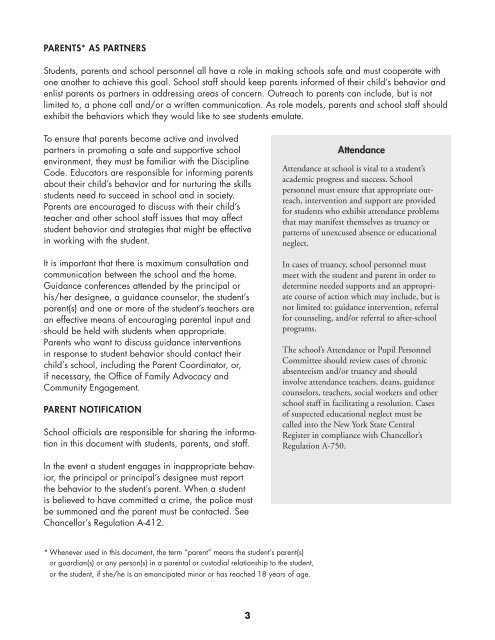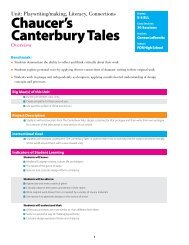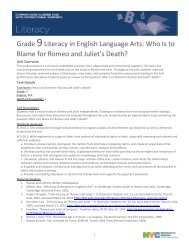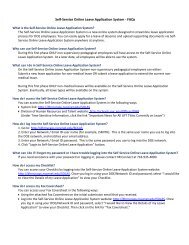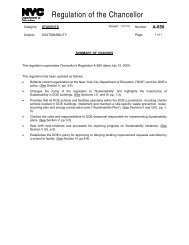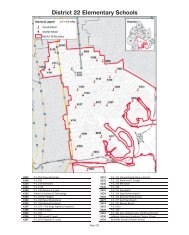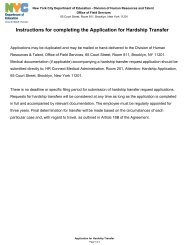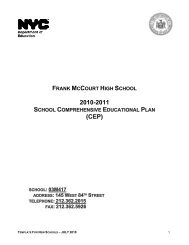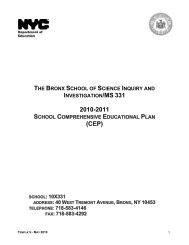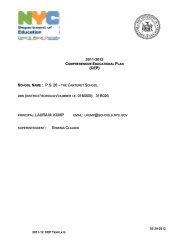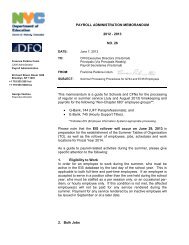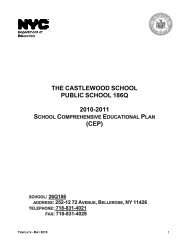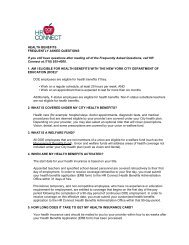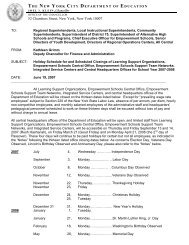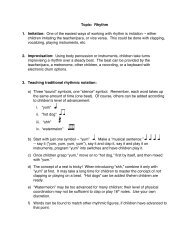Citywide Standards of Intervention and Discipline Measures
Citywide Standards of Intervention and Discipline Measures
Citywide Standards of Intervention and Discipline Measures
Create successful ePaper yourself
Turn your PDF publications into a flip-book with our unique Google optimized e-Paper software.
PARENTS* AS PARTNERS<br />
Students, parents <strong>and</strong> school personnel all have a role in making schools safe <strong>and</strong> must cooperate with<br />
one another to achieve this goal. School staff should keep parents informed <strong>of</strong> their child’s behavior <strong>and</strong><br />
enlist parents as partners in addressing areas <strong>of</strong> concern. Outreach to parents can include, but is not<br />
limited to, a phone call <strong>and</strong>/or a written communication. As role models, parents <strong>and</strong> school staff should<br />
exhibit the behaviors which they would like to see students emulate.<br />
To ensure that parents become active <strong>and</strong> involved<br />
partners in promoting a safe <strong>and</strong> supportive school<br />
environment, they must be familiar with the <strong>Discipline</strong><br />
Code. Educators are responsible for informing parents<br />
about their child’s behavior <strong>and</strong> for nurturing the skills<br />
students need to succeed in school <strong>and</strong> in society.<br />
Parents are encouraged to discuss with their child’s<br />
teacher <strong>and</strong> other school staff issues that may affect<br />
student behavior <strong>and</strong> strategies that might be effective<br />
in working with the student.<br />
It is important that there is maximum consultation <strong>and</strong><br />
communication between the school <strong>and</strong> the home.<br />
Guidance conferences attended by the principal or<br />
his/her designee, a guidance counselor, the student’s<br />
parent(s) <strong>and</strong> one or more <strong>of</strong> the student’s teachers are<br />
an effective means <strong>of</strong> encouraging parental input <strong>and</strong><br />
should be held with students when appropriate.<br />
Parents who want to discuss guidance interventions<br />
in response to student behavior should contact their<br />
child’s school, including the Parent Coordinator, or,<br />
if necessary, the Office <strong>of</strong> Family Advocacy <strong>and</strong><br />
Community Engagement.<br />
PARENT NOTIFICATION<br />
School <strong>of</strong>ficials are responsible for sharing the information<br />
in this document with students, parents, <strong>and</strong> staff.<br />
In the event a student engages in inappropriate behavior,<br />
the principal or principal’s designee must report<br />
the behavior to the student’s parent. When a student<br />
is believed to have committed a crime, the police must<br />
be summoned <strong>and</strong> the parent must be contacted. See<br />
Chancellor’s Regulation A-412.<br />
* Whenever used in this document, the term “parent” means the student’s parent(s)<br />
or guardian(s) or any person(s) in a parental or custodial relationship to the student,<br />
or the student, if she/he is an emancipated minor or has reached 18 years <strong>of</strong> age.<br />
3<br />
Attendance<br />
Attendance at school is vital to a student’s<br />
academic progress <strong>and</strong> success. School<br />
personnel must ensure that appropriate outreach,<br />
intervention <strong>and</strong> support are provided<br />
for students who exhibit attendance problems<br />
that may manifest themselves as truancy or<br />
patterns <strong>of</strong> unexcused absence or educational<br />
neglect.<br />
In cases <strong>of</strong> truancy, school personnel must<br />
meet with the student <strong>and</strong> parent in order to<br />
determine needed supports <strong>and</strong> an appropriate<br />
course <strong>of</strong> action which may include, but is<br />
not limited to: guidance intervention, referral<br />
for counseling, <strong>and</strong>/or referral to after-school<br />
programs.<br />
The school’s Attendance or Pupil Personnel<br />
Committee should review cases <strong>of</strong> chronic<br />
absenteeism <strong>and</strong>/or truancy <strong>and</strong> should<br />
involve attendance teachers, deans, guidance<br />
counselors, teachers, social workers <strong>and</strong> other<br />
school staff in facilitating a resolution. Cases<br />
<strong>of</strong> suspected educational neglect must be<br />
called into the New York State Central<br />
Register in compliance with Chancellor’s<br />
Regulation A-750.


